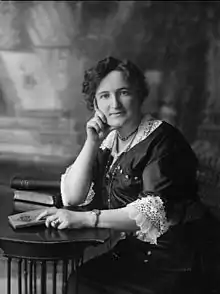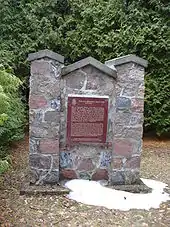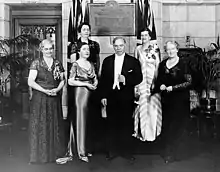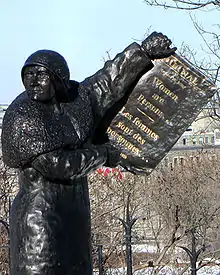Nellie McClung
Nellie Letitia McClung (born Letitia Ellen Mooney; 20 October 1873 – 1 September 1951) was a Canadian author, social activist, suffragette, and politician. She was a part of the social and moral reform movements prevalent in Western Canada in the early 1900s. Her great causes were women's suffrage and temperance. It was because of her hard work and advocacy, that in 1916 Manitoba became the first province to give women the right to vote and to run for public office.[2] Nellie McClung was at the forefront of the Suffragist [3]movement in Canada. Through her social justice activism, the issues of temperance, anti-war (enfranchisement of Japanese Canadians and opening the Canadian Border to Jewish Refugees[4]),[5] Labor and Dower rights were among her most important contributions.
Nellie McClung | |
|---|---|
 | |
| Member of the Legislative Assembly of Alberta | |
| In office 18 July 1921 – 28 June 1926 | |
| Succeeded by | John Lymburn, Charles Weaver, Charles Gibbs, Warren Prevey and David Duggan |
| Constituency | Edmonton |
| Personal details | |
| Born | Letitia Ellen Mooney 20 October 1873 Chatsworth, Ontario, Canada |
| Died | 1 September 1951 (aged 77) Victoria, British Columbia, Canada |
| Nationality | Canadian |
| Political party | Liberal |
| Spouse(s) | Robert Wesley McClung[1] |
| Occupation | Social activist |
| Known for | Women's rights activist |
In 1927, McClung and four other women: Henrietta Muir Edwards, Emily Murphy, Louise McKinney and Irene Parlby who together came to be known as The Famous Five (also called "The Valiant Five")[6] launched "the Persons Case," contending that women could be "qualified persons," therefore eligible to sit in the Senate. The Supreme Court of Canada ruled that the current law did not recognize women as such. However, the case was won upon appeal to the Judicial Committee of the British Privy Council—the court of last resort for Canada at that time.
Early life
Nellie McClung Mooney was born at Chatsworth, Ontario in 1873, the youngest daughter of John Mooney, an Irish immigrant farmer and a Methodist, and his Scottish-born wife, Letitia McCurdy. Her father's farm failed and the family moved to Manitoba in 1880.[7] She received six years of formal education and did not learn to read until she was nine.[8] She later moved with her family to a homestead in the Souris Valley of Manitoba.[9]


Career
In both the 1914 and 1915 Manitoba provincial elections, she campaigned for the Liberal party on the issue of the vote for women. She helped organize the Women's Political Equality League, a group devoted to women's suffrage. A public speaker known for her sense of humour, she played a leading role in the successful Liberal campaign in 1914.[9] She also played the role of the Conservative Premier of Manitoba, Rodmond Roblin, in a mock Women's Parliament staged in Winnipeg in 1914 under the auspices of the Canadian Women's Press Club. The theatrical effort was designed to expose the absurdity of the arguments of those opposed to women's suffrage by pretending to debate whether the franchise should be granted to men. Nellie and her colleagues celebrated the defeat of the Roblin government in August 1915 but by the time Manitoba became the first province in Canada to grant women the vote on 28 January 1916, under the new Liberal government, she had already moved to Edmonton, Alberta.[10]
In Edmonton, McClung continued her career as an orator, author, and reformer.[11] In 1921, she was elected to the Alberta Legislative Assembly as a Liberal. She then moved to Calgary, Alberta in 1923, and dedicated herself to writing. She had already written her first novel, Sowing Seeds in Danny, published in 1908. A national bestseller, the book was succeeded by short stories and articles, McClung wrote in several Canadian and American magazines.
After moving to Edmonton, she continued the campaign for suffrage. She understood that the First World War had played an important role in broadening the appeal of women's suffrage. The manpower shortages during this time required widespread female employment, making the image of the sheltered female not applicable to Canadian circumstances.[7] She championed dental and medical care for school children, property rights for married women, mothers' allowances, factory safety legislation and many other reforms. While arguing for equitable divorce laws, of which she was a longtime supporter, McClung once asked, "Why are pencils equipped with erasers if not to correct mistakes?"[7]
McClung was active in many organizations. She founded the Winnipeg Political Equality League [12] in addressing educational and social issues, including the factory working conditions, and the Federated Women's Institutes of Canada—"the largest adult education movement in Canada"—and the Women's Institute of Edmonton, of which she was the first president. She was active in the Canadian Authors' Association, the Canadian Women's Press Club, the Methodist Church of Canada, the Calgary Women's Literary Club, among others.[13]
She sat as a Liberal member of the Legislative Assembly of Manitoba,[14] and then Legislative Assembly of Alberta from 1921 to 1926, in opposition to the government of the United Farmers of Alberta. Her opportunity to press for women's rights was limited because women were not taken seriously.[7]
She was one of The Famous Five (also called The Valiant Five), with Irene Parlby, Henrietta Muir Edwards, Emily Murphy and Louise McKinney. The five put forward a petition, in 1927, to clarify the term "Persons" in Section 24 of the British North America Act 1867. This section had served to exclude women from political office. The petition was successful, clearing the way for women to enter politics in Canada.[2]
Eugenics
McClung was a supporter of the then-popular social philosophy of eugenics and campaigned for the sterilization of those considered "simple-minded". Her promotion of the benefits of sterilization contributed to the passage of eugenics legislation in Alberta.[15][16]
As a maternal feminist, McClung believed that women should be involved in politics due to their natural maternal instincts and interests which included the interests of the health of mothers and children. At the time this was important to maternal feminists, who positioned women as both the mothers and guardians of their race. They, therefore, championed legislation aimed against alcoholism, "mental defectiveness,"[17] and prostitution. McClung voiced her views in her 1915 book, In Times Like These:
to bring children into the world, suffering from the handicaps caused by ignorance, poverty, or criminality of the parents, is an appalling crime against the innocent and hopeless, and yet one about which practically nothing is said. Marriage, homemaking, and the rearing of children are left entirely to chance, and so it is no wonder that humanity produces so many specimens who, if they were silk stockings or boots, would be marked "seconds".
McClung and others believed the sterilization procedures would prevent further problems. Nellie McClung and her close friend, Emily Murphy, are regarded as two of the most prominent and influential supporters of Alberta's Sexual Sterilization Act, which organized the involuntary sterilization of people considered "mentally deficient."[17] The law was enacted in 1928 and repealed in 1972. During that time, thousands of people who were considered "psychotic" or "mentally defective" underwent eugenic sterilization.[17]
Family
Her father John "Johnny" Mooney (12 December 1812 – 5 January 1893) came to Canada in 1830 and lived in Bytown and later Ottawa. Born in Nenagh, Tipperary, Ireland, John Mooney worked with lumbermen. In 1841, he took up a land grant across from Georgian Bay. He first married his cousin Margaret, who died a year after their marriage. In 1856, he re-married to his second wife, Letitia McCurdy (1833-1920), who had recently immigrated from Scotland, and they had seven children (one of whom died at the age of four). He later died in Manitoba in 1893.
Her mother Letitia McCurdy (1 June 1833 – 27 February 1920) was born in Dundee, Scotland. She travelled to Canada, and shortly after married John Mooney (1812-1893) in 1856. She raised a family of seven children (one of whom was Nellie, and another died at the age of four), and she died in Winnipeg, MB in 1920.
Between 1904 and 1915,[10] Nellie McClung, her husband Robert McClung, a pharmacist, and their five children - four boys and one girl[18] resided in Winnipeg, Manitoba where, from 1911 until 1915, McClung fought for women's suffrage. Nellie Married Robert Wesley McClung (31 October 1871 – 1 November 1958) on 25 August 1896, in Oakland, MB, and with whom she had five children. Wesley was born in 1871 in Manvers Township, Durham, ON, and trained as a pharmacist. He later worked as an insurance salesman, in the capacity of circuit manager for Manufacturers' Life. He died in 1958 in Saanich, BC.
Children
- John Wesley "Jack" McClung (son) (16 June 1897 – 1944): married to Lillian Johnston. John was a lieutenant in the Princess Pat Canadian Light Infantry during the First World War. He was a prosecuting attorney for the Alberta Department of Justice at the time of his death in 1944. McClung was the grandmother of Alberta judge John McClung
- Florence Letitia McClung (daughter) (28 January 1899 – 6 February 1990): m.
- Atkinson Paul Harper McClung (son) (20 November 1900 – 1 April 1961): m. Edna Montgomery
- Horace Barrie McClung (son) (23 June 1906 – 13 March 1974): m. Grace McNamara
- Mark McClung (son) (b. 11 October 1911): m. Yrma Mitchell. Mark worked in the Secretary of State department of the Government of Canada.[19]
Legacy
In 1954, Nellie McClung was named a Person of National Historic Significance by the government of Canada. A plaque commemorating McClung is located on the west side of Hwy 6, 1 km south of Hwy 40, Chatsworth, Ontario.[20]
On August 29, 1973, Nellie McClung and the other five women who were involved in the "Persons Case" were honoured with an 8 cent stamp.[21] In addition, the "Persons Case" was recognized as a Historic Event in 1997.[22]
In October 2009, the Senate of Canada voted to name Nellie McClung and the rest of the Five Canada's first "honorary senators."[23]
Nellie McClung was a popular and accomplished author during her lifetime, published in Canada and the United States. Her monographs include extensive lists of short stories, novels, essays, and autobiographies, .[14]
Houses
McClung's house is in Calgary, Alberta, her residence from 1923 to the mid-1930s, still stands and is designated a heritage site.[11] Two other houses in which McClung lived were re-located to the Archibald Museum[24] near La Rivière, Manitoba in the Rural Municipality of Pembina where they have been restored. In 2017 the two houses were moved to Manitou, Manitoba.[25] The houses are open to the public. The McClung family residence in Winnipeg is also a historic site.[26]
Bibliography
| Library resources about Nellie McClung |
| By Nellie McClung |
|---|

Fiction
- Sowing Seeds in Danny. Toronto: William Briggs. 1908.
- The Second Chance. New York: Doubleday, Page & Co. 1910.
- The Black Creek Stopping House: And Other Stories. Toronto: William Briggs. 1912.
- Purple Springs. Boston and New York: Houghton Mifflin. 1922.
- When Christmas Crossed 'The Peace'. Toronto: Thomas Allen. 1923.
- Painted Fires. Toronto: Thomas Allen. 1925. - Painted Fires. Early Canadian Literature series (reprint ed.). Waterloo, Ontario: Wilfrid Laurier University Press. 2014 [1925].
- All We Like Sheep. Toronto: Thomas Allen. 1926.
- Be Good to Yourself: A Book of Short Stories. Toronto: Thomas Allen. 1930.
- Flowers for the Living. Toronto: Thomas Allen. 1931.
- Connie Brummel Crook (1994). Nellie L.. Markham: Stoddart Kids.
Non-fiction
- In Times Like These. Toronto: McLeod & Allen. 1915.
- The Next of Kin. Houghton Mifflin. 1917. - The Next of Kin at Google Books
- Three Times and Out: A Canadian Boy's Experience in Germany. Boston and New York: Houghton Mifflin. 1918.
- Clearing in the West: My Own Story. Toronto: Thomas Allen. 1935.
- Leaves from Lantern Lane. Toronto: Thomas Allen. 1936.
- Before They Call ... (pamphlet). Board of Home Missions, United Church of Canada. 1937.
- More Leaves from Lantern Lane. Toronto: Thomas Allen. 1937.
- The Stream Runs Fast. Toronto: Thomas Allen. 1945.
See also
References
- "Nellie McClung 1873–1951". Famous Women in Canada. Mount Allison University / The Centre for Canadian Studies. 2001. Archived from the original on 2 March 2010. Retrieved 10 April 2010.
- Library and Archives Canada. Nellie Letitia (Mooney) McClung. Celebrating Women's Achievements. Archived 29 June 2008 at the Wayback Machine
- "Suffragist v. Suffragette". www.thecanadianencyclopedia.ca. Retrieved 5 December 2019.
- "Did You Know? – The Nellie McClung Foundation". Retrieved 6 December 2019.
- "Japanese Canadians | The Canadian Encyclopedia". www.thecanadianencyclopedia.ca. Retrieved 5 December 2019.
- Kome, Penney (1985). Women of Influence: Canadian Women and Politics (1st ed.). Toronto: Doubleday Canada. p. 31. ISBN 978-0-3852-3140-4.
- Strong-Boag, Veronica (2004). "McClung [née Mooney], Nellie Letitia (1873–1951)". Oxford Dictionary of National Biography (online ed.). Oxford University Press. doi:10.1093/ref:odnb/65562. (Subscription or UK public library membership required.)
- Sanderson, Kay (1999). 200 Remarkable Alberta Women. Calgary, Alberta: Famous Five Foundation. p. 23. Archived from the original on 19 October 2015. Retrieved 29 September 2015.
- Hallett, M.E. (1 April 2008). "Nellie McClung". The Canadian Encyclopedia (online ed.). Historica Canada. Retrieved 29 September 2015..
- Nutkin, Harry; Gutkin, Mildred (Autumn 1996). "Give Us Our Due! How Manitoba Women Won the Vote". Manitoba History. The Manitoba Historical Society. 32. Retrieved 29 September 2015.
- Nellie McClung House. Canadian Register of Historic Places.
- "Political Equality League – The Nellie McClung Foundation". Retrieved 22 November 2019.
- Encyclopedia of Canadian Adult Education. "Nellie McClung". University of the Fraser Valley. Retrieved 1 February 2016.
- "Nellie McClung's Literary Legacy | Digital Collections @ Mac". hpcanpub.mcmaster.ca. Retrieved 22 November 2019.
- "University of Alberta". The Eugenics Archives. Retrieved 6 December 2019.
- Marsh, James (6 March 2013). "Eugenics: Keeping Canada Sane". The Canadian Encyclopedia (online ed.). Historica Canada. Retrieved 29 September 2015.
- "Nellie McClung | The Canadian Encyclopedia". www.thecanadianencyclopedia.ca. Retrieved 21 March 2019.
- Conrad, Margaret; Finkel, Alvin, eds. (2006). History of the Canadian Peoples: 1867 to the present. Volume 2 (Fifth ed.). Toronto: Pearson, Longman. p. 134. ISBN 0-3215-3908-7.
- "Nellie Letitia McClung | CWRC/CSEC". cwrc.ca. Retrieved 24 November 2019.
- McClung, Nellie Mooney National Historic Person. Directory of Federal Heritage Designations. Parks Canada.
- Library and Archives Canada (16 September 2010). "Nellie Letitia (Mooney) McClung". collectionscanada. Archived from the original on 24 November 2019. Retrieved 8 April 2018.
- Persons Case National Historic Event. Directory of Federal Heritage Designations. Parks Canada.
- "Alberta's Famous Five named honorary senators". The Globe and Mail. The Canadian Press. 11 October 2009. Retrieved 29 September 2015.
- "Archibald Museum (RM of Pembina)". Historic Sites of Manitoba. Manitoba Historical Society. Retrieved 29 September 2015.
- Redekop, Bill (7 September 2017). "Home, at last". Winnipeg Free Press. Retrieved 11 September 2017.
- "McClung House (97 Chestnut Street, Winnipeg)". Historic Sites of Manitoba. Manitoba Historical Society. Retrieved 29 September 2015.
Further reading
- Bruce Peel Collection at University of Alberta Rutherford South Library/ Expert Linda Quirk: Linda Quirk Article: Historical Perspectives on Canadian Publishing website here: http://hpcanpub.mcmaster.ca/hpcanpub/case-study/nellie-mcclung-s-literary-legacy
- Sarah Carter -- A legacy of ambivalence : responses to Nellie McClung in Perry, Adele, Veronica Jane Strong-Boag, and Mona Gleason. 2002. Rethinking Canada : The Promise of Women's History. Oxford University Press. https://search.ebscohost.com/login.aspx?direct=true&db=cat03710a&AN=alb.2591365&site=eds-live&scope=site.
- Warne, R. R. 2006. Literature as pulpit: the Christian social activism of Nellie L. McClung. http://search.ebscohost.com/login.aspx?direct=true&scope=site&db=nlebk&db=nlabk&AN=1433259.
- http://rabble.ca/blogs/bloggers/bound-not-gagged/2016/01/seven-important-parts-nellie-mcclungs-dynamic-and-complicate
- Warne, R. R., and Canadian Corporation for Studies in Religion. 2006. Literature As Pulpit : The Christian Social Activism of Nellie L. McClung. Dissertations SR. [Waterloo, Ontario]: Wilfrid Laurier University Press. https://search.ebscohost.com/login.aspx?direct=true&db=e000xna&AN=1433259&site=eds-live&scope=site.
External links
| Library resources about Nellie McClung |
| By Nellie McClung |
|---|
| Wikimedia Commons has media related to Nellie McClung. |
- Cook, Ramsay; Bélanger, Réal, eds. (2016). "Mooney, Helen Letitia (McClung)". Dictionary of Canadian Biography. XVIII (1951–1960) (online ed.). University of Toronto Press.
- Heritage Minutes: Nellie McClung
Elctronic editions
- Works by Nellie McClung at Project Gutenberg
- Works by Nellie Letitia McClung at Faded Page (Canada)
- Works by or about Nellie McClung at Internet Archive
- Works by Nellie McClung at LibriVox (public domain audiobooks)
